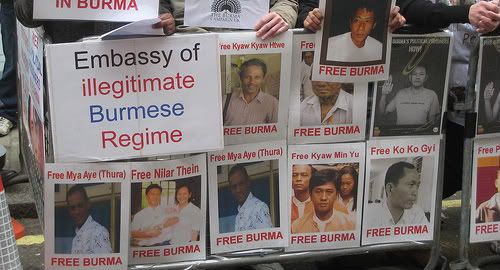Nora Murat
Nora is the Executive Director of Amnesty International Malaysia.

Families and friends of 8.8.88's victims demanding answers
On 8 August, Myanmar will commemorate the 22nd anniversary of the largest protests in Myanmar’s history against the military junta. This regime had been internationally criticized for its poor human rights record and the manner in which it has governed the country. More than twenty years later, Myanmar’s military regime still comes under severe criticism from international observers for its obvious violations of human rights and for the introduction of its election laws in March 2010, which exclude from the electorate whole sectors of Burmese society and ban any political prisoner from becoming a member of a political party.
Myanmar has only ratified two human rights treaties: the Convention on the Elimination of All Forms of Discrimination against Women and the Convention of the Rights of the Child. However, the provisions of these treaties are not adequately reflected in domestic law. The Myanmar government is urged to ensure that the election scheduled to take place later this year will be free and fair and observe the three freedoms of expression, association and assembly.
In March 1988, mass demonstrations began to take place in Yangon in opposition to the military junta in which clashes between protesters and police broke out. On 8 August of that year, hundreds of thousands took part in a mass demonstration across the country. The protests ended on 18 September when the military opened fire on the demonstrators. It was reported that around 3,000 demonstrators were killed by the military during the course of the protests.
The Myanmar Government continued to curtail any opposition to their regime by detaining political prisoners and by combating protests with force. In 1990, a general election was called in which Aung San Suu Kyi, opposition leader for the National League for Democracy (NLD), won over 80% of the votes. The military junta refused to acknowledge the result of this election. Aung San Suu Kyi was placed under house arrest during the election, where she remains between intermittent bouts of freedom.
More than 20 years after these events, the people of Myanmar continue to be subjected to human rights abuses at the hands of their leaders. The 2008 Constitution, due to come into effect after the general election this year, undermines international human rights standards, since it removes the right to vote from various sectors of society, grants to the President powers of suspension of fundamental freedoms during undefined states of emergency, does not contain any provisions for the prohibition of torture or other ill-treatment, and violates the right to freedom of expression by
criminalizing the right to dissent under security laws.
In May 2008, Khun Bedu, Khun Kawrio and Khun Dee De from the Kayan ethnic group were arrested for carrying out a peaceful protest against a government referendum for the introduction of the new Constitution. The protest involved the releasing of balloons, launching of paper boats, and spray-painting of walls with peaceful political messages campaigning for a ‘No’ vote. All three were sentenced by a military court, without a judge or legal representative present. Bedu and Kawrio were each sentenced to 37 years in prison while Dee De was sentenced to 35 years.
It is believed that there are currently over 2,200 political prisoners being detained in Myanmar, none of whom are permitted to vote under the regulations laid out in the Election Laws. Since 2007, the UN Security Council has repeatedly called for their release.
The fundamental right to the ‘three freedoms’ – freedom of expression, association, and assembly – have been severely curtailed by the Myanmar Government with the introduction of Acts such as the 1962 Printers and Publishers Registration Act, the Unlawful Association Act, Section 505(B) of the Penal Code, the Electronic Transactions Law, and the 1950 Emergency Provisions Act. On 21 June this year, a directive was issued by the Union Election Commission which prohibits political parties from carrying out campaigning activities that ‘harm security, the rule of law and community peace.’
There have been numerous calls from the international community for Myanmar to hold a free and fair election. At the opening of their 43rd Annual Ministerial Meeting in Hanoi on 20 July 2010, ASEAN openly called for this. Article 1.7 of the ASEAN Charter, which was signed by Myanmar on 20 November 2007, calls for the Member States ‘to strengthen democracy, enhance good governance and the rule of law, and to promote and protect human rights and fundamental freedoms’ and for the Member States to adhere to the principle of ‘adherence to the rule of law, good governance, the principles of democracy and constitutional government’ [Article 2.2(h)].
The United Nations, United States and European Union have also called on Myanmar to create a stable political environment in which a fair and credible election can take place. Amnesty International Malaysia calls on the government of Myanmar:
-
to guarantee the ‘three freedoms’ of expression, association, and assembly for all and this includes allowing its citizens the freedom to participate or not participate in the elections, report openly on the elections, print campaign material without censorship, speak freely and without sanction to the media and hold meetings or demonstrations;
-
to release all political prisoners immediately;
-
for policing during the elections, particularly of any demonstrations that take place, and for the police and military to be restrained and not to restrict people’s right to assembly.
-
for the international community, particularly Myanmar’s neighbours and other concerned governments, to publicly call for the ‘three freedoms’ to be respected by the Myanmar Government and to be prepared to speak out forcefully if individuals are harassed and detained for their peaceful political views and activities in the run-up to the elections.
Freedom of expression, assembly and association are fundamental human rights to be enjoyed by every human being. The Myanmar Government is urged to respect these rights and allow its citizen to exercise them. Myanmar now has an opportunity to hold a free, fair and credible election in which all of its citizens should be permitted to partake. The international community has made its position clear on these matters and the Myanmar Government is urged to take heed of this. The world will be watching.

